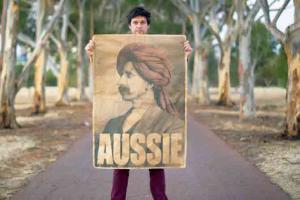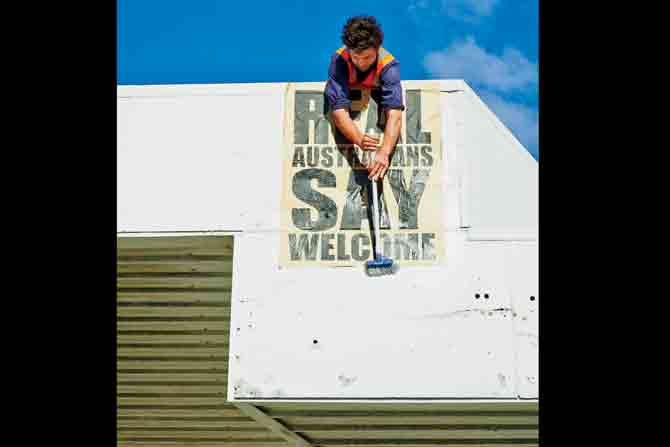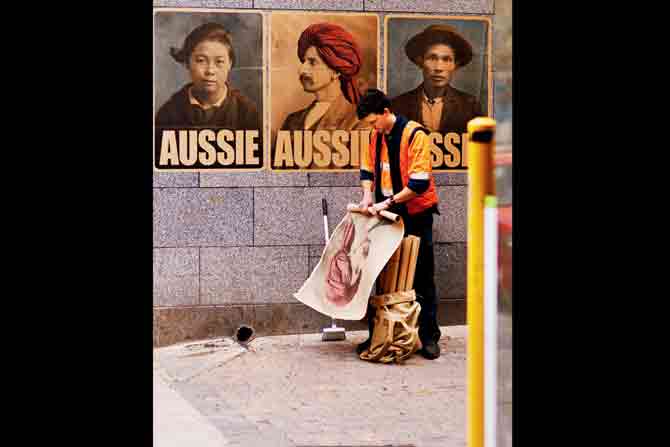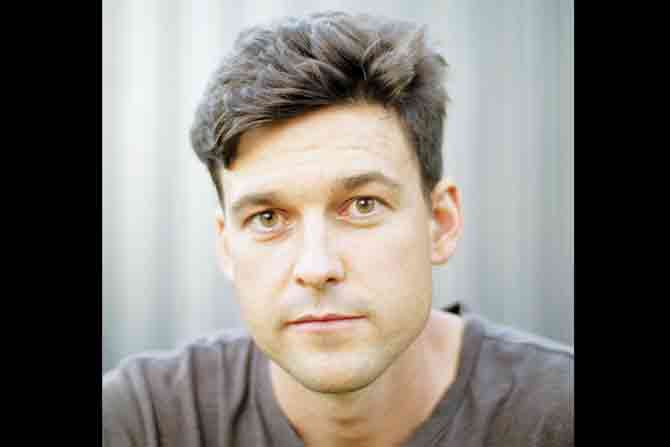At a time when the message of multiculturalism is needed more than ever, a 37-year-old Australian artist is traversing the country pasting posters of an Indian-origin man to start a conversation on migrants and national identity.

It was in 2016 that Peter Drew learnt about Monga Khan, who became the poster boy for his existing campaign
"My wife Julie and I were studying at the Glasgow School of Art in Scotland. I think that is when I started thinking about national identity. Because when I was overseas, I suddenly became 'that Australian guy'," Adelaide-born artist Peter Drew says about the genesis of a project that has kept him busy since 2015.
ADVERTISEMENT
That same year, in 2013, Australia's federal election was on. Both major parties were promising "to stop the boats" that carry asylum seekers to Australia. "I thought the phrase was absurd to come from a nation of immigrants. In Australia, a majority of the population are descendants of immigrants. It was an odd contradiction for a nation dependent on migrants," adds Drew, 37.
Australia has granted asylum to many refugees since 1945, when half a million Europeans were displaced by World War II. Since then, there have been periodic waves of asylum seekers from South East Asia and the Middle East, with government policy and public opinion changing over the years. But in 2013, Australia decided to resume its policy of transferring asylum seekers offshore. Since July that year, the country has transferred more than 3,000 asylum seekers, who travelled there by boat to detention camps in Papua New Guinea and Nauru.

Drew’s crowdfunding campaign that started in 2015 involved putting up 3,000 posters across the country that read, Real Australians Seek Welcome. PIC/Rebecca Mansell
Drew returned home, hoping to address the issue. With help from friends, he met one family at a time, stuck in detention centres. They made sketches, and he transferred the images onto posters and roamed the streets to paste them. By 2015, he launched a crowdfunding initiative. Bold black capitals on a brown paper background began to appear on walls across Australian cities. A total of 3,000 posters were put up, with help from volunteers, and they all read: Real Australians Seek Welcome. "I am not sure if emotions are the best way to address the issue. Showing an emotion like compassion doesn't help you to counter fear [of the outsider]. You have to use different tactics," Drew thinks.
But what the posters did do was trigger conversation. And yet, Drew was missing a representative face for the campaign. In 2016, he found the face in Monga Khan.
Born in British India in Batrohan village of Punjab, Khan arrived in Australia in 1895. He worked as a foot hawker, travelling between towns to sell goods. Over a hundred years ago, in 1916, he had his photograph taken so that he could apply for an exemption to the newly-introduced White Australia Policy. He wanted to be able to go back to India to see his family, and still be welcomed in Australia to continue his job. "It was a powerful photograph that I found in the national archives. He looked heroic."

Monga Khan’s poster in Cronulla, a beachside suburb of Sydney
In the poster Drew designed, Khan, resplendent in a turban, sits above a solitary word—AUSSIE. "You look at him, and think, I want to meet him. To think that he was walking the streets of Ballarat in Victoria, it makes you wonder what an interesting place Australia was at the time."
To date, Drew has pasted close to 5,000 posters. He takes out four months of the year to travel to various parts of Australia. "What makes this annual project interesting to people is that one man is on a slightly odd mission," Drew laughs about himself, adding, "It is physically impossible to carry 1,000 posters at a time, so at intervals, I head back home, collect them in turns and carry on."
Staying in youth hostels, he uses their kitchens to cook up a pot of glue before hitting the streets early morning. He says, "Sometimes, a confrontation ensues. The most typical thing I have been told is, 'Khan is not a real Aussie'. But I tell them that he [Khan] lived in Australia, worked here, is even buried here. So, he is as much Aussie as anybody else."

Drew spends three to four months every year sticking posters of immigrants in Australia
After Khan, Drew has celebrated others who arrived in Australia during the time of the White Australia Policy (1901-1958), including Ballkhoo Balooch (Karachi), Abdullah Khalik (Karachi), Shah Mahomed Khan (India), Bhugwan Singh (India), and sisters Dorothy Sym Choon and Glady Sym Choon (China). Drew says art has done its job—sharing a point of view and letting the audience decide for themselves. "If some people want to be fearful and bigoted, it is their choice. Personally, I prefer not to live like that. So, if I can make people less fearful, and more accepting of immigrants, my job is done here."
The Coronavirus pandemic has interestingly impacted immigration policies, and the place migrants hold in societies. India saw one of the worst intra-country migrations when lakhs of migrants who held jobs in cities lost their livelihoods overnight due to the national lockdown, and had little choice but to head home to their villages.
In the absence of available transport and little government help, they took to the streets with their families and luggage in tow, some of them walking thousands of kilometres to their homes. Drew says the story is the same across nations. "The pandemic has made borders stricter and immigration policies tougher. This will continue for a while until people are ready to open their arms again for migrants," he adds.

Peter Drew
Refugees have been on the agenda in the US and UK elections this year, too, so Drew is positive about change. He says although he realised his goal was an ambitious one given the size of the country, he has received encouraging words from immigrants who believe someone is raising a voice for them. "They say it makes them feel welcome in the country. The reactions surprise me because it's tough to get a message across to someone you don't know."
Inspiring the art world
Inspired by Drew's initiative, Minna Leunig, a Melbourne-based artist, donated a reworked poster of Monga Khan which raised $510 at an auction, with all the proceeds going to the Asylum Seeker Recourse Centre. Although of India origin, Khan is remembered as an Aussie legend.
View Peter Drew's latest exhibition, Flags 1, at the Peter Walker Gallery, where he uses the Australian flag blended with images of people from the Australian National Archives to question perceptions of national identity.
https://www.peterdrewarts.com/2020-flags
Keep scrolling to read more news
Catch up on all the latest Mumbai news, crime news, current affairs, and a complete guide from food to things to do and events across Mumbai. Also download the new mid-day Android and iOS apps to get latest updates.
Mid-Day is now on Telegram. Click here to join our channel (@middayinfomedialtd) and stay updated with the latest news
 Subscribe today by clicking the link and stay updated with the latest news!" Click here!
Subscribe today by clicking the link and stay updated with the latest news!" Click here!







